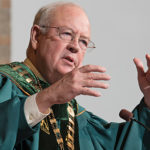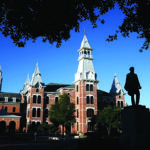WACO—Baylor University’s board of regents voted unanimously to move forward with construction of the school’s $250 million football stadium complex, pending a favorable final vote by Waco’s City Council Aug. 7.

This is an artist's rendering of 45,000-seat Baylor Stadium, expected to be completed in fall 2014.
|
The Baylor Stadium project is expected to help stimulate riverfront development, revitalize downtown Waco and bring jobs and economic development to the region, university officials noted.
After favorable discussion and public input, the Waco City Council on July 17 voted unanimously to a $35 million public contribution endorsed without dissent earlier in the month by the downtown Tax Increment Financing Zone board. A second council vote is required in August.
The public funds would cover a portion of infrastructure around the stadium, such as roads, construction of a pedestrian bridge to provide access across the Brazos River, development of a new marina, the relocation of sewer and electric transmission lines, and water, sewer and drainage facilities to serve the site.
“We are grateful for the unanimous support of the TIF board and Waco City Council,” Baylor Regent Chair Richard Willis said. “The Baylor Stadium complex will be a tremendous asset for both Baylor and the greater Waco community. We’re proud to be partnering with the city in this remarkable project.”
Since March, Baylor has received major gifts for the stadium from alumni Elizabeth and Drayton McLane Jr., Sheridan and John Eddie Williams Jr. and Sheila and Walter Umphrey.
A successful fundraising campaign in the spring and summer—along with approved TIF funding and between $100 to $120 million in Baylor-issued bonds—will allow construction to begin this fall, and the stadium complex to be completed in fall 2014. Baylor played its first football game on campus in 1899 but has played in an off-campus stadium since 1936 and in Floyd Casey Stadium, its current home, since 1950.
“The momentum that has formed around the football stadium and community events complex is spectacular,” said Baylor President Ken Starr. “We are humbled that our vision for this facility has been embraced so enthusiastically by generous and dedicated Baylor alumni, and our faithful partners in the city. The project has captured the imagination of those who can envision the transformative effect that something of this significance can have on our university and on our community.”
Sign up for our weekly edition and get all our headlines in your inbox on Thursdays
Baylor Stadium is expected to be built on a 93-acre site at the intersection of Interstate 35 and the Brazos River. The stadium will hold 45,000 spectators, with the flexibility to expand to 55,000, and it will feature a bridge crossing the Brazos connecting the stadium to the campus.
Baylor also announced the contractor for the Baylor Stadium project is a partnership between Austin Commercial-Flintco. The companies have worked on such Big 12 football facilities as Oklahoma State’s Boone Pickens Stadium, Oklahoma’s Gaylord Family Memorial Stadium and TCU’s Amon G. Carter Stadium. The architect for the project is Kansas City, Mo.-based Populous, which has designed several stadiums, including Yankee Stadium and the new football stadium at the University of Minnesota.
“This project will serve as a catalyst for driving development in the riverfront area, which will generate strong, positive, long-term economic benefits to downtown and the city,” said Reagan M. Ramsower, senior vice president for operations and chief financial officer at Baylor. “We look forward with great excitement and enthusiasm to this extension and expansion of Baylor’s proud partnership with our beloved hometown of Waco.”
“Baylor Stadium will be the most modern, fan-friendly college football facility in the nation, and it will ensure that the Bears are a major player in college football for decades to come,” said Ian McCaw, director of athletics at Baylor. “I am grateful to Baylor’s lead donors, board of regents, President Starr and senior administration, along with the leaders in the city and county for making it a reality.
“The economic impact and job creation that will result from the stadium will improve the quality of life in our community and impact our citizens for years to come.”
Also during the summer board meeting, Regents voted to increase next year’s undergraduate tuition by 6.5 percent for 12 hours or more during the fall 2013 and spring 2014 academic year. With its flat-rate tuition plan, Baylor’s tuition will be $16,287 per semester or $32,574 for the 2013-2014 academic year. Tuition for graduate and professional programs will increase similarly.
The general student fee will increase 8.58 percent to $1,699 per semester or $3,398 for the 2013-2014 academic year. Room and board rates for undergraduates will increase by 5 percent and 4.61 percent, respectively.
Baylor’s 2013-2014 budget will continue to provide financial aid to families and students who demonstrate financial need, with an increase of $13.3 million to support merit and need-based scholarships, graduate assistantships and scholarships for graduate and professional students.
Baylor also will continue to offer affordability scholarships, a student-led initiative enacted by the board in fall 2011, which will provide about $4 million to assist successful continuing students with financial need. The President’s Scholarship Initiative will provide about $1 million a year toward student scholarships.














We seek to connect God’s story and God’s people around the world. To learn more about God’s story, click here.
Send comments and feedback to Eric Black, our editor. For comments to be published, please specify “letter to the editor.” Maximum length for publication is 300 words.